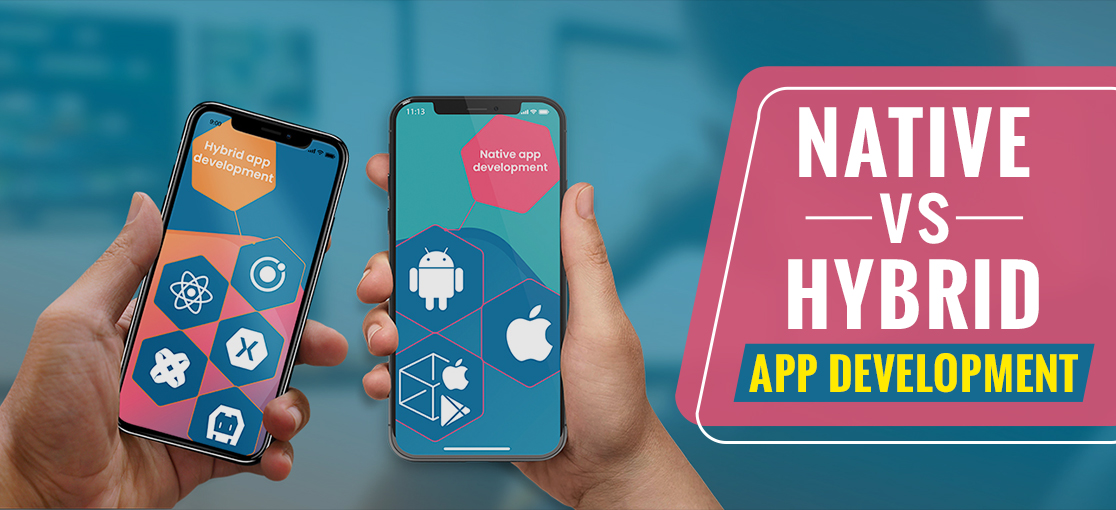- Web App Development
Native Vs. Hybrid App Development
Posted on 1-07-2021
Posted by devmin

With us moving in a fast-paced technological environment, most businesses have already realized the importance of web presence and mobile apps. However, if we dig deeper to it, we come across multiple options and technologies. As a business owner or technology partner, it can be overwhelming sometimes to choose among different technology choices. Different technologies offer different sets of advantages and disadvantages, and it fundamentally depends on your business requirement to choose one.
Today we are talking about the Native vs. Hybrid app development for your app. You must understand both of these technologies to answer the question of “whether to choose Hybrid or Native app development?”
It basically depends on your own business objectives, app requirements, and budget.
Now, the majority of smartphone users are using Android and iPhones. So, as a business, you have to decide which technology to pursue in terms of app development, iOS or Android?
The answer to this question of whether to choose native or hybrid apps is simply about your target audience. If your target audience majorly includes iPhone users or Android users, you should go for native app development. However, if you are not sure about your audience’s preferred platform or use both platforms equally, you should plan to build cross-platform or Hybrid app development. It helps you with budget and time.
However, if you are not short on budget and time, you can build native apps for both platforms exclusively. Choosing any one type of development is more about your business needs. The one that best fits your business needs would be the perfect choice for you.
Native Apps
A native mobile app is specific to a particular platform, including iOS or Android. For instance, a native android app can be installed only on android devices. For iOS and other platforms, the company needs to build another platform-specific app. Android native apps are generally built using Java, while iOS native apps are built using Objective-C or Swift.
Benefits of Native Apps
If you can build apps for more than one platform, why choose native apps and spend individually for each platform? A native app offers some benefits that encourage development teams to select it for their app development. Let’s take a look at some benefits of Native apps.
Fast and Responsive
Native Apps are comparatively faster and more responsive than Hybrid apps. These apps are built specifically for a particular device, so they better use the device resources. They are far more reliable in terms of speed and responsiveness.
Device Functionality
A native app can best use the device’s functionality and features, including camera, speakers, microphone, and GPS, etc.
Working Offline
Native apps are good at providing offline functionalities in the mobile app. With a native app, you can use some of the app features without internet connectivity. For instance, for an ecommerce app, you can open the app, add items to the cart, and shop when you are online.
Disadvantages
The primary disadvantage of native apps is that you have to build separate apps for different platforms, which takes more time and money. But again, when you invest more time and capital on something, you generally get better results. So, these apps are built with a separate codebase with specific programming languages and platforms.
Hybrid Apps
A hybrid application is a blend of native and web apps. These apps are built with HTML, CSS, and JavaScript. The application is closed into a native shell and can be accessed once downloaded from the mobile application stores. These apps make use of plugins and tools to get access to the device functionalities, including camera, GPS, and microphone.
Benefits of Hybrid Apps
Hybrid app development enables companies to build one app and use it on different platforms. This is the fundamental advantage that hybrid app offers and entice businesses to invest in Hybrid development. Let’s take a brief look at some of the key benefits of the same.
One Codebase and Cost-Effective
Hybrid apps are developed with a single codebase and are run on both platforms; iOS and Android. This helps businesses to build one app for both platforms in relatively lesser time and cost. Moreover, the development time is reduced, and the developers get relief from the hassle of creating two separate apps. In short, with Hybrid apps, you get shortened development timelines, less expensive, and scalability.
Access to Device Features
Like native apps, hybrid apps can also use features of different devices y using plugins. So, hybrid apps can simply use features of both android and iOS devices but with the use of additional tools.
Disadvantages
The shortcoming with the hybrid development is that the product is not as fast or responsive as native apps. Moreover, running a Hybrid app on various platforms is not as cheap or simple as it might seem. Another downside of the Hybrid app is the struggle to offer a customized user experience as good as with the native apps.
The Bottom Line
By now, you know the basic difference between native and hybrid apps. This must help you choose one among these. If you have made your mind whether to choose a hybrid or native app for your business or entrepreneurial app, you can get in touch with us to take your dream ahead.
We are a professional application development company with experienced developers, designers, and strategists to help you decide the best technology for your business and budget. You can discuss your business and get relevant advice for it. Moreover, we update our clients thoroughly during the project and offer post-maintenance services as well.
So, what did you choose? Native or Hybrid app? Let us know and start working on your project today.
Feel Free To Reach Out



